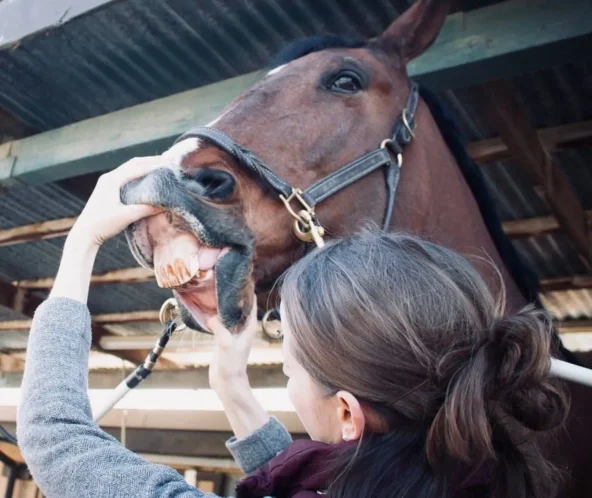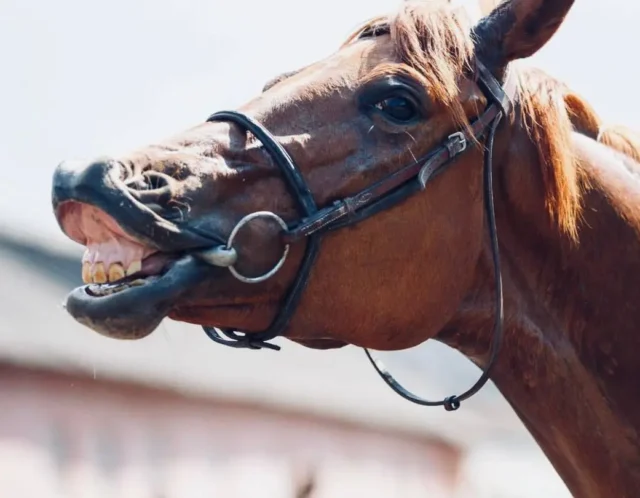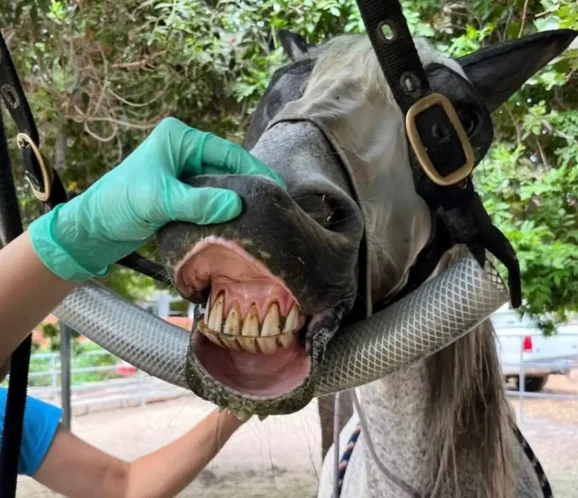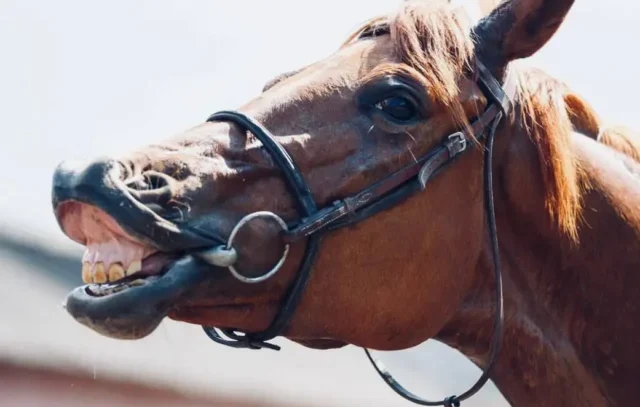What is Floating Horse Teeth? Understanding Equine Dental Care
Imagine your horse struggling to eat, dropping hay from its mouth, or resisting the bit. These could all be signs of hidden dental pain caused by sharp points on its teeth. Floating, a specialized dental procedure where these rough edges are smoothed out, can offer your horse relief and is vital for its long-term health.
Unlike us, horses’ teeth grow continuously, and their diet can cause uneven wear, leading to problems that affect more than just their mouths.

Equine dental care, specifically teeth floating, helps to ensure the horse can eat effectively and comfortably. A horse uses its front teeth to snip or cut hay and grass, and the back teeth, or cheek teeth, to grind forage in a side-to-side motion.
Without regular maintenance, the sharp points that develop on the cheek teeth can result in sores on the inside of the mouth and gums, leading to an array of health issues.
The procedure is usually performed by a veterinarian or qualified equine dentist. It encourages a healthy grinding pattern that aids in digestion and prevents premature tooth wear.
Regular dental exams are recommended to determine the need for floating, and the frequency can vary based on individual horses and their conditions.
Floating horse teeth is not just about addressing current dental problems; it is also a preventative measure to maintain the horse’s overall well-being and performance.
Understanding Equine Dental Care
Equine dental care is a critical aspect of maintaining a horse’s overall well-being. Proper attention to a horse’s teeth can prevent numerous dental issues and improve the quality of life.
Why Regular Dental Exams are Important?
Regular dental exams are essential for your horse’s well-being. Here’s why:
- Early Detection: Exams allow a trained eye to catch issues like sharp edges or uneven wear before they become painful or affect eating.
- Preventative Care: Your vet or equine dentist can assess your horse’s specific needs and recommend steps to prevent future problems.
- Pain Management: Dental discomfort can affect your horse’s attitude and performance. Exams help ensure they remain comfortable.
- Long-Term Protection: Untreated dental issues can lead to severe complications. Regular exams and timely care can save you money and your horse from unnecessary suffering.
Functions of Horse Teeth

Horse teeth are central to their ability to eat and digest food effectively. They have incisors for cutting grass and premolars and molars for grinding forage into a pulp.
As horses age, their teeth continue to erupt, and this continual growth requires regular monitoring by an equine dentist to ensure that the teeth wear evenly and maintain proper alignment.
Common Dental Issues
Horses can face various dental issues that impact their oral and dental health. Sharp edges or hooks can develop on teeth, leading to discomfort and changes in behavior.
Common dental issues include uneven tooth wear and periodontal disease. Inconsistent chewing patterns can also indicate the presence of a dental issue.
Neglecting dental health may lead to more severe conditions such as weight loss, colic, and dental disease. Regular dental exams are key components of comprehensive horse dental care to identify and address these issues promptly.
Horse Teeth 101: Essential Facts for Owners
- Beyond Chewing: Horses use their teeth for more than just eating! Their front teeth (incisors) help them grasp and tear grasses, while their cheek teeth grind food into a digestible pulp.
- The Power of Prevention: Routine dental exams are crucial for catching and correcting problems early. Most horses benefit from a professional checkup at least once a year, with performance horses often needing more frequent exams.
- Watch for the Signs: Don’t wait for a crisis! Be observant of potential dental issues, including weight loss, dropping feed (“quidding”), excessive drooling, foul breath, or resistance to the bridle.
Caring for Your Horse’s Teeth: Owner’s Checklist
- Vet Partnership: Collaborate with your veterinarian to create a personalized dental plan for your horse, taking into account its age, breed, diet, and performance level.
- Find the Right Dentist: Choose a qualified professional with experience in equine dentistry. Recommendations from your vet or fellow horse owners are a great starting point.
- Don’t Ignore the Basics: In addition to floating, good overall care matters! Provide your horse with regular forage, fresh water, and opportunities for natural grazing whenever possible.
The Rewards of a Healthy Mouth
Investing in your horse’s dental health pays dividends:
- Happy Eating: A comfortable mouth means your horse can enjoy its meals and maintain a healthy weight.
- Optimal Digestion: Proper chewing is the first step in good digestion, ensuring your horse gets the most out of its feed.
- Improved Performance: Without dental pain, your horse can focus on training and reach its full potential.
- Long-term Well-being: Proactive dental care, including floating, helps prevent serious issues down the road, saving you money, stress, and your horse from unnecessary discomfort.
The Process of Teeth Floating
Teeth floating is a crucial dental care procedure that involves the gentle filing down of sharp edges or points on a horse’s teeth. This practice ensures proper mouth function and maintains the health and comfort of the horse.
The Floating Process: Step by Step
Floating is typically performed by a veterinarian specializing in equine dentistry or a certified equine dentist. Here’s a breakdown of the process:
- Preparation: Your horse may be sedated to ensure its comfort and safety throughout the procedure.
- Accessing the Mouth: A mouth speculum is used to hold the horse’s mouth open, allowing the practitioner easy access to all the teeth.
- Identifying Problem Areas: The practitioner carefully examines the teeth, looking for sharp edges, hooks, misalignments, or other abnormalities.
- Precision Filing: Specialized rasps (file-like tools) are used to gently smooth out any rough areas. The goal is to create an even chewing surface without removing excessive tooth material.
- Rinse and Repeat: The practitioner may periodically rinse the horse’s mouth to remove debris and better assess their progress.
Why Floating Is Necessary
Floating is essential because horses’ teeth grow continuously throughout their lives. As they graze and chew, uneven wear patterns can occur, often resulting in sharp edges that can cause pain or difficulty eating.
Equine dental floating addresses these issues by evening out these molars and other teeth, making it easier for the horse to chew food effectively and comfortably.
Tools and Techniques
A professional, usually a veterinarian or an equine dentist, performs the procedure using specialized tools. Before the process begins, a mouth speculum is often placed to keep the horse’s mouth open for easy access to the teeth. Sedation might be administered to ensure the horse’s comfort and safety.
The practitioner then uses rasps — long, flat, file-like tools — to smooth out the sharp edges on the horse’s molars and other teeth. The teeth are carefully rasped, or filed down, without removing too much material to prevent causing the horse undue discomfort or tooth sensitivity.
Effects on Horse Health and Behavior

Proper dental care is crucial in maintaining a horse’s well-being and behavior. Teeth floating can alleviate discomfort and promote efficient digestion, influencing both physical condition and behavior.
Physical Impact of Dental Problems
Horse’s teeth continuously grow and can develop sharp points or uneven wear, leading to discomfort and pain. If unaddressed, such dental issues can result in weight loss, malnutrition, and a decline in overall health.
The process of teeth floating serves to smooth out rough edges, allowing a horse to chew feed effectively, which is essential for proper digestion and nutrient absorption, thereby maintaining a healthy body condition.
Behavioral Indicators of Oral Discomfort: Horse Dental Problem Symptoms
A horse experiencing oral discomfort may exhibit behavioral changes. Signs such as resistance to the bit, dropping feed, or head tossing can indicate a sore mouth.
Horse owners must be vigilant for these behavioral cues as they often indicate the horse is in need of dental care to improve its quality of life and eating habits, ensuring the animal’s well-being.
- Eating difficulties: Dropping food, eating slowly, or refusing to eat.
- Resisting the bit: Head tossing, trouble turning, or not wanting to be bridled.
- Sensitivity around the head: Acting resentful when you touch their face or ears.
- Drooling more than usual or bad breath.
- General grumpiness: Seems irritable or out of character.
Important: If you notice these signs, schedule a dental exam! Sometimes other things can cause these behaviors, but it’s best to rule out dental pain and keep your horse comfortable.
Considerations for Horse Owners
When it comes to equine health, proactive dental care is crucial. Horse owners should prioritize routine dental exams to ensure their horse’s well-being and to prevent potential challenges that can arise from dental issues.
Routine Dental Exams and Care
Routine dental exams are an essential part of a horse’s healthcare regimen. A horse’s mouth contains sharp enamel points that can develop on the edges of the teeth, and these can lead to discomfort or more serious health issues if left unaddressed.
Most equine veterinarians recommend scheduling a dental examination at least once a year.
This exam is used to assess the presence of any dental problems such as overgrowths, misalignments, or other abnormalities.
Regularly performing horse teeth floating, which involves the filing down of sharp points, can prevent issues related to eating, behavior, and bit usage.
Proper dental care should coincide with routine hoof care and exercise to maintain the horse’s overall health and performance.
Choosing the Right Equine Dentist
Choosing an equine dentist or veterinarian with specialized training in dentistry is critical. Horse owners should look for professionals who possess not only the necessary qualifications but also a wealth of experience in dealing with equine oral health.
This could mean choosing an equine veterinarian who has an in-depth understanding of the unique dental needs of horses, or a specialist who focuses exclusively on equine dentistry.
Though cost is a consideration, it should not override the importance of quality care. A thorough examination by a qualified dentist can help detect and treat dental issues early, ultimately saving money and hassle in the long term.
It’s important to research and choose a trusted professional to ensure the best possible outcomes for your horse’s dental health.
Frequently Asked Questions
This section provides answers to common inquiries regarding the practice of floating teeth in horses, shedding light on why it’s necessary and how it’s conducted.
What are the signs of dental problems in horses?
Horses with dental issues may show a range of signs, including:
- Eating Difficulties: Dropping food (“quidding”), slow chewing, weight loss, refusing hard treats.
- Mouth Issues: Excessive drooling, bad breath, facial swelling, sores in the mouth.
- Behavioral Changes: Resisting the bit, head tossing, head shyness, irritability.
- Performance Issues: Reluctance to work, inconsistent head carriage, uncharacteristic behaviors.
Important: These signs can also indicate other conditions. Always consult your veterinarian for a dental exam and to rule out any underlying health issues. Early diagnosis and treatment are key to your horse’s comfort and well-being.
Why do horses require teeth floating?
Horses require teeth floating to smooth out sharp edges or hooks that can form on their teeth, which, if left unmanaged, can lead to discomfort, pain, and problems with eating or bit fitting.
How often should horses have their teeth floated?
Most mature horses benefit from having their teeth floated yearly, while high-performance horses may require more frequent dental check-ups every 6-9 months due to the regular use of a bit.
What are the signs that indicate a horse needs teeth floating?
Signs Your Horse May Need Teeth Floating
Eating Difficulties:
- Dropping food (“quidding“)
- Eating slowly, reduced appetite, or weight loss
- Difficulty with hard treats
Mouth Issues:
- Excessive drooling
- Bad breath
- Facial swelling or sores inside the mouth
Behavioral Changes:
- Resisting the bit, head tossing, or head shyness
- Increased irritability or uncharacteristic behaviors
Performance Issues:
- Reluctance to work, inconsistent head carriage
Important: These signs can have other causes. Always consult your vet or equine dentist for a proper diagnosis and to discuss the best course of action.
What are the potential consequences of neglecting to float a horse’s teeth?
Neglecting to float a horse’s teeth can lead to:
- Pain & Discomfort: Sharp edges cause mouth sores, affecting eating and behavior.
- Weight Loss & Malnutrition: Difficulty chewing hinders proper nutrient absorption.
- Severe Dental Disease: Untreated issues risk infection, tooth decay, or even tooth loss.
- Digestive Problems: Poor chewing disrupts digestion, potentially leading to colic.
- Performance Issues: Pain makes training difficult and hinders athletic ability.
- Costly Vet Bills: Neglect often results in more complex and expensive treatment later on.
Remember: Proactive dental care, including floating, is essential for your horse’s long-term health and well-being!
Are there differences in dental care needs between wild and domestic horses?
Wild horses naturally grind down their teeth through constant grazing on varied, fibrous vegetation. In contrast, domestic horses, with more restricted diets and feeding patterns, may not wear their teeth as evenly. This emphasizes the need for regular dental care.
Eager to learn more about horses? Explore our other horse care articles!
Follow AnimalVine on Google News!







